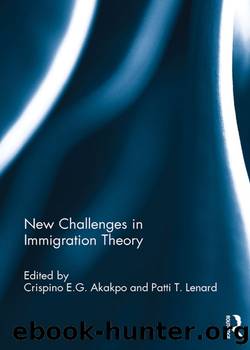New Challenges in Immigration Theory by Crispino E.G. Akakpo Patti Tamara Lenard

Author:Crispino E.G. Akakpo, Patti Tamara Lenard [Crispino E.G. Akakpo, Patti Tamara Lenard]
Language: eng
Format: epub
Tags: Nonfiction, Social & Cultural Studies, Social Science, Sociology
ISBN: 9781317515524
Publisher: Taylor and Francis
Published: 2017-10-02T04:00:00+00:00
1.2. Bonding
Another proposal is not to outright prevent highly skilled emigration, but rather to impose some restrictions through monetary or in-kind bonding. Monetary bonding requires that skilled emigrants pay a fee to compensate for the cost of their education; in-kind bonding demands that skilled workers complete a period of service (Cole 2010, p. 122). Usually the ground for bonding is that graduates have benefited from public support for their education. Bonding functions as a temporary restriction on emigration and is often justified on the grounds that people receiving public education have freely entered into an implicit or explicit contract to repay benefits received.
Though bonding has plausibility as a measure to fairly compensate for lost human capital, it too faces moral and practical concerns. First, in the case of in-kind bonding, we might ask how âvoluntaryâ is it for people to restrict their freedom of occupation and movement for a significant period after studying. The people that have to enter into these sorts of contracts to pursue their education are likely to be among the more vulnerable segments of the educated population. This objection may be overcome in some circumstances, but the conditions of choice must be carefully scrutinized.
Second, if we see bonding as a permissible measure to insure repayment of public services, then the state may have a moral claim to the services of most citizens. Many members of a legitimate, functioning state have received benefits in excess of their contributions. It seems morally arbitrary to compel only those who possess highly valued skills to a period of indentured labor (Cole 2010, p. 125). The fact that people with more natural ability or who possess special skills have chosen certain professions may justify compelling them to contribute more income for redistribution, but taxation for redistribution will not generally centrally affect peopleâs plans and relationships to the degree that the temporary restriction of freedom of movement and occupation would do (Blake and Brock forthcoming).
Bonding also faces practical obstacles if its purpose is to make it more likely that people with skills build institutions that lead to long-term growth. If the purpose of restricting emigration is to build institutions, recently graduated workers are unlikely to contribute to this task because they lack the experience, connections, or the long-term time commitment to accomplish much. Perhaps their labor will enable the state to recoup some of the costs of educating them, but it is unlikely to be an effective remedy to the conditions that encourage skilled workers to leave (Bueno de Mesquita and Gordon 2005, p. 57).
Download
This site does not store any files on its server. We only index and link to content provided by other sites. Please contact the content providers to delete copyright contents if any and email us, we'll remove relevant links or contents immediately.
International Integration of the Brazilian Economy by Elias C. Grivoyannis(111059)
The Radium Girls by Kate Moore(12028)
Turbulence by E. J. Noyes(8050)
Nudge - Improving Decisions about Health, Wealth, and Happiness by Thaler Sunstein(7707)
The Black Swan by Nassim Nicholas Taleb(7129)
Rich Dad Poor Dad by Robert T. Kiyosaki(6633)
Pioneering Portfolio Management by David F. Swensen(6301)
Man-made Catastrophes and Risk Information Concealment by Dmitry Chernov & Didier Sornette(6019)
Zero to One by Peter Thiel(5802)
Secrecy World by Jake Bernstein(4753)
Millionaire: The Philanderer, Gambler, and Duelist Who Invented Modern Finance by Janet Gleeson(4478)
The Age of Surveillance Capitalism by Shoshana Zuboff(4293)
Skin in the Game by Nassim Nicholas Taleb(4250)
The Money Culture by Michael Lewis(4207)
Bullshit Jobs by David Graeber(4191)
Skin in the Game: Hidden Asymmetries in Daily Life by Nassim Nicholas Taleb(4007)
The Dhandho Investor by Mohnish Pabrai(3765)
The Wisdom of Finance by Mihir Desai(3748)
Blockchain Basics by Daniel Drescher(3583)
